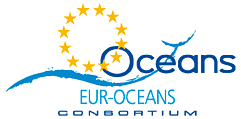EUR-OCEANS Consortium
The EUR-OCEANS Consortium (EOC) is the legacy programme of the EUR-OCEANS European Network of Excellence (EO NoE), which is co-funded by the Sixth Framework Programme for Research and Technological Development of the European Communities (FP6). EUR-OCEANS activities started in January 2005 and ran for 4 years until December 2008. Since 1st January 2009, the EOC has been ensuring the continuity and further integration of Member Organisations of the former EO NoE, and other interested marine research organisations, including more than 60 research institutes and universities from 25 countries. The overall objective of EUR-OCEANS is to achieve lasting integration of European research organisations on global change and pelagic marine ecosystems and the relevant scientific disciplines putting Europe in an international leadership position in this field.
EUR-OCEANS Flagship for Polar Ecosystem Change and Synthesis (PECS)
Following on from the Foresight Workshop in 2010 (see below), the EUR-OCEANS Consortium awarded a 2-year flagship to scientists at the British Antarctic Survey (BAS) and Alfred-Wegener-Institute for Polar and Marine Research (AWI). The central focus of the Flagship is on coordination, integration and leadership of polar ecosystem science within Europe. Our first workshop was held in November 2012 and outcomes included a Strategy for European polar marine ecosystem research. This was followed in May 2013 by a Thematic Workshop on Polar Ecosystems in Brussels. The Summary and Conclusions of the Thematic Workshop can be downloaded here. The EUR-OCEANS Consortium 2009-2013 report is available here. This includes a summary report of the PECS Flagship (p26-27). For more information contact us.
EUR-OCEANS Foresight Workshops
In November 2010, ICED scientists convened a EUR-OCEANS Foresight workshop on 'Global Change in Polar Ecosystems'. Emphasis was placed on strengthening and coordinating European research in this area. Further details are available here.
ICED and the Southern Ocean System

EUR-OCEANS has been closely involved in the development of the ICED programme since its inception. The strong partnership with ICED enabled the EUR-OCEANS Southern Ocean System to lead and coordinate Southern Ocean research not only within Europe but internationally. Their activities (including coordination, data mining, fieldwork and networking) facilitated work developing models linking large-scale climate processes, local-scale ocean physics and anthropogenic forcing with biogeochemistry, food web dynamics and ecosystem structure. This work was fundamental to high-level policy makers in the development of Southern Ocean ecosystem conservation and management strategies.
The Southern Ocean System was one of seven marine systems within the EUR-OCEANS network. It aimed to coordinate science activities with links to the Southern Ocean through integration and jointly executed research.
Modern Insights from Historic Southern Ocean Expeditions
Work has beeen ongoing to retrieve biological information from
a series of historic Southern Ocean cruises. The cruises span the period
from 1925 to the 1980s, including the Discovery Expeditions and the
Biological Investigations of Marine Antarctic Systems and Stocks
(BIOMASS). This work aims to retrieve information on Southern Ocean
pelagic species abundance and distribution to help build a complete
picture of the changing circumpolar ecosystem and was initially funded by the
European Commission through the EUR-OCEANS Network of Excellence for
Ocean Ecosystems Analysis. These projects fit closely with ICED core objectives on data retrieval and synthesis. For more information contact us.








